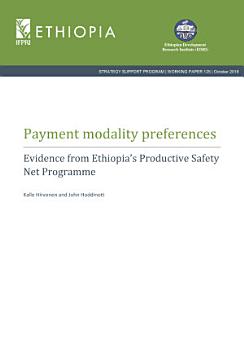Payment modality preferences: Evidence from Ethiopia’s Productive Safety Net Programme
Hirvonen, Kalle · Hoddinott, John F.
okt. 2018 · ESSP Working Paper 125. knjiga · Intl Food Policy Res Inst
5,0star
1 mnenjereport
E-knjiga
25
Strani
family_home
Primerno
info
reportOcene in mnenja niso preverjeni. Več o tem
O tej e-knjigi
Economists typically default to the assumption that cash is always preferable to an in-kind transfer. We extend the classic Southworth (1945) framework to predict under what conditions this assumption holds. We take the model to longitudinal household data from Ethiopia where a large-scale social safety net intervention – the Productive Safety Net Programme (PSNP) – operates. Even though most PSNP payments are paid in cash, and even though the (temporal) transaction costs associated with food payments are higher than payments received as cash, the overwhelming majority of the beneficiary households prefer their payments only or partly in food. However, these preferences are neither homogeneous nor stable. Higher food prices induce shifts in preferences towards in-kind transfers, but more food secure households and those closer to food markets and to financial services prefer cash. There is suggestive evidence that preferences for food are also driven by self-control concerns.
Ocene in mnenja
5,0
1 mnenje
Ocenite to e-knjigo
Povejte nam svoje mnenje.
Informacije o branju
Pametni telefoni in tablični računalniki
Namestite aplikacijo Knjige Google Play za Android in iPad/iPhone. Samodejno se sinhronizira z računom in kjer koli omogoča branje s povezavo ali brez nje.
Prenosni in namizni računalniki
Poslušate lahko zvočne knjige, ki ste jih kupili v Googlu Play v brskalniku računalnika.
Bralniki e-knjig in druge naprave
Če želite brati v napravah, ki imajo zaslone z e-črnilom, kot so e-bralniki Kobo, morate prenesti datoteko in jo kopirati v napravo. Podrobna navodila za prenos datotek v podprte bralnike e-knjig najdete v centru za pomoč.










